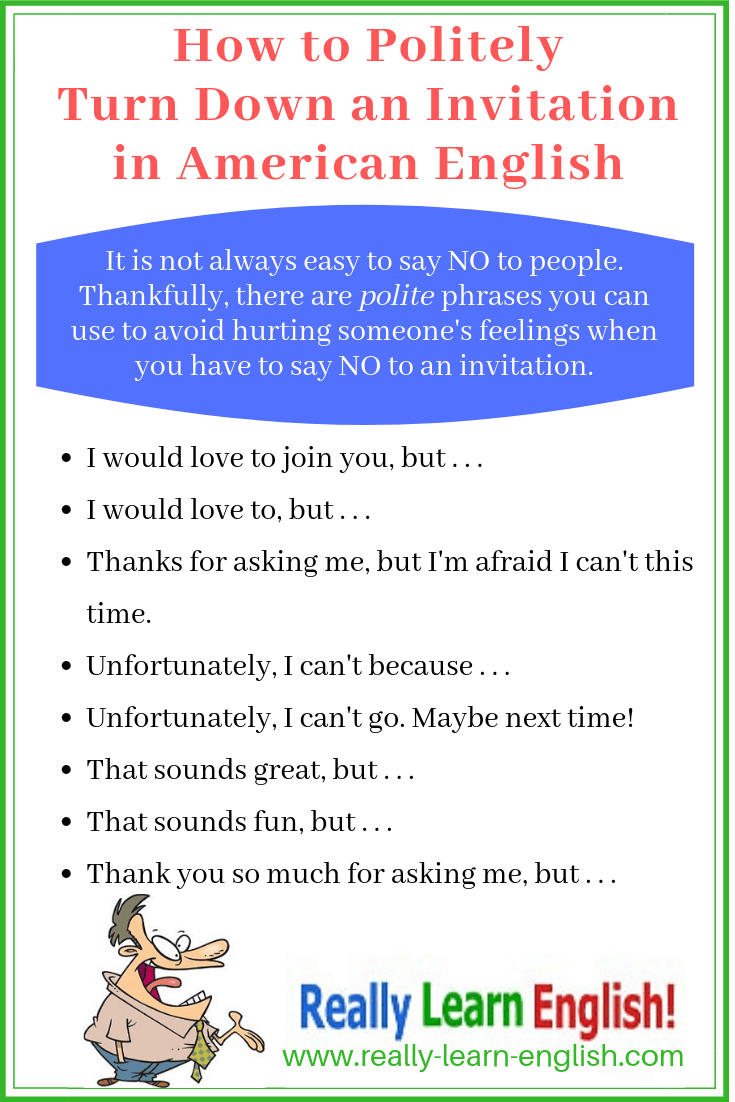How to be polite in english
How to be polite in english
Mind Your Manners: How to Be Polite in English Using Grammar Tricks
“Thanks, Grandpa Warren!”
I said this to one of my college professors at the end of class one day.
Yes. My college professor.
We both stopped for a moment of uncomfortable silence. Professor Baker was one of my favorite professors, and my friends and I sometimes called him “grandpa” affectionately.
However, saying it to him was a different story.
I apologized and called him by the correct title, then ran out of the classroom.
In the best-case scenario, using informal English at the wrong time can be uncomfortable. In worst case scenarios, using impolite English could impact your job or your grades.
When you’re learning English, it’s important to also learn that English has formal and informal uses. Learn when to use polite English to avoid uncomfortable situations and you’ll be more successful in academic and business settings.
And don’t worry! We can help you learn polite English so you don’t make the same mistake I did.
Download: This blog post is available as a convenient and portable PDF that you can take anywhere. Click here to get a copy. (Download)
Polite English: Does It Really Matter?
Why do you need to learn polite English?
Using formal or polite English is a sign of respect. You should use formal English when you’re at work, at school or meeting new people.
This will help you avoid offending anyone. You’ll look more professional and caring.
Informal English in formal settings often sounds rude or arrogant (too proud). In contrast, polite English will make you seem more likeable and may lead to more success in school or at work.
It’s also important to learn polite English if you’re traveling to an English-speaking country. You don’t want to offend people during your travels!
Practical Ways to Learn Polite English
So, how exactly can you learn polite English? You might know some basics, like saying “please” and “thank you,” but there’s more to being polite than that.
You can start by learning from my mistake. If someone has a title, like Professor, Doctor, Mr., Ms. or Mrs., always use their title! In a workplace or when talking to someone of authority, you should never use their first name unless they ask you to.
You can also work on your polite English by watching movies and TV shows that take place in an office or school setting. Some great examples to watch are:
These movies and shows are fun to watch but will also help you learn. Pay attention to when characters use formal speech and when they use informal speech. It might be helpful to write down who they’re talking to and where they are when they use formal speech.
Finally, you can learn polite English by listening to other people in your workplace or classroom and seeing how they talk.
We’ve also done some of the work for you by collecting some tips and tricks for making informal phrases sound more polite. Take a look at the list below and practice making your own sentences sound more polite.
You might also learn some new English grammar tricks along the way!
Mind Your Manners: How to Be Polite in English Using Grammar Tricks
Here are seven ways to use grammar to sound more polite and respectful when talking in English. These tips and tricks will allow you to survive in any English social situation!
We’ve included lots of examples to help you practice.
1. Use Questions Instead of Statements
Instead of telling people to help you with tasks, you can turn your statement into a question. Make sure that you’re giving the other person the chance to say no.
Using questions makes you sound nicer and more considerate (thoughtful and nice). Even if you need something done right away, making it a question will make the other person more willing to help.
Instead of: Finish the presentation.
Say: Can you finish the presentation?
Instead of: I need help with this assignment.
Say: Will you help me with this assignment?
2. Use Vague (Unclear) Language
You can come off as sounding impolite if you’re too direct. Instead, you can say things in a way that sounds more flexible. Do this by softening your language.
People will usually understand the details even if you use vague (unclear) terms. Here are some examples.
Instead of: Meet me at twelve o’clock.
Say: Meet me around lunch time.
Instead of: It’s cold, turn up the temperature.
Say: I’m kind of cold. Would you mind if I turn up the temperature just a little?
3. Add Some Explanation
When you’re communicating at work or school, it’s often a good idea to include explanation. If you’re asking someone to do something for you, or explaining a problem, people will feel better if they know a few details.
You can use English words and phrases like because, so, therefore or that’s why… to add your explanation.
Instead of: Finish this presentation by tomorrow.
Say: The buyer is coming tomorrow, so I’d like you to finish the presentation by then.
Instead of: I didn’t want to go to your party.
Say: I didn’t want to go to your party because I was really sick.
4. Use Modal Verbs to Soften Requests
I already mentioned that using questions is more polite than using statements. However, questions can be made even more polite with the use of modal verbs.
Modal verbs, such as would, could, will, can, should, must, might and shall are often used in formal speech. When in doubt, use a modal verb to make any question or statement sound more polite.
Instead of: I want the stapler.
Say: I would like the stapler.
Instead of: Let’s get dinner.
Say: Shall we get dinner?
5. Use the Passive Voice
When something goes wrong in a professional setting, the passive voice becomes very important. The passive voice is a way to avoid naming a subject.
This is great for polite English because you can address an issue without putting the blame on anyone in particular. It’ll save you from sounding mean.
Instead of: Jonathan gave me the wrong information.
Say: I was given the wrong information.
Instead of: Sally broke the printer, so we can’t make copies.
Say: The printer was broken, so we can’t make copies.
6. Switch to the Past Tense
Another way to make your English more polite is to switch to past tense. When you’re using the verbs “want” or “need,” it’s more polite to use past tense than present tense.
Instead of: Do you want coffee?
Say: Did you want any more coffee?
Instead of: Do you need anything else?
Say: Did you need anything else?
7. Use Common Polite Phrases
Grammar tricks are great, but sometimes, all you need to know are a few common polite phrases.
As you study English (and especially if you immerse yourself in English), you’ll learn more and more common phrases that people use to be polite.
Here are a few phrases you might use in a formal environment. These are great for when problems arise and you need a tactful (not rude) way to address the situation. These phrases are recognized as being polite while still getting the point across.
Instead of: I already told you this.
Say: As I mentioned previously…
Instead of: This is wrong.
Say: This could use some improvement.
Instead of: You must do this.
Say: Thanks in advance for your help!
Instead of: I don’t want to do that.
Say: Thanks, but I’d rather not.
Now that you’ve spent some time studying polite English grammar and phrases, you’ll probably start to notice polite English everywhere. Pay attention to how people talk to their friends and how they talk to their coworkers or their boss.
Polite English is everywhere. We use it when we talk to people at work or at school, but also when we’re talking to the bus driver or the server at a restaurant.
Take some time to practice your polite English so that you’ll be ready to succeed in any formal setting!
Download: This blog post is available as a convenient and portable PDF that you can take anywhere. Click here to get a copy. (Download)
How To be Polite in English
Does it seem like the things you say often cause offense? Are you having trouble getting people to respond to your requests? If so, maybe people are percieving that your English isn’t polite. Learn how to avoid being rude with this great guide!
Being polite in English
Can you pass me…? vs Give me…
People do not like being told what to do, so it’s sometimes difficult to get what you want without causing frustration. Replace phrases that sound like commands, such as “Give me the newspaper”, with a request like “Can you pass me the newspaper?”
What is your English level?
Take our short English test to find out.
Could you give me five minutes? vs Go away
You’re really busy at work, but your coworker needs your help… When you’re busy and can’t attend to anything else, just saying “Go away” is definitely not appropriate. Instead, keep everyone happy by using the phrase “Could you give me five minutes?”
Excuse me. vs Move
Telling someone to “Move out of the way” is extremely rude and is likely going to get you a very negative reaction. The next time someone is in your way, saying “Excuse me” will get the result you want without causing offense!
I’m afraid I can’t. vs No.
It can often be difficult to decline an invitation from a friend. Simply saying “No” would be considered impolite. The next time you have to refuse an invitation, avoid offense by saying, “I’m afraid I can’t.”
I would like… vs I want…
It’s often considered rude to request something using the words, “I want”. Instead of, “I want a cup of coffee”, try telling a waiter, “I’d like a cup of coffee, please”. You’ll get your coffee and a smile, too!
Would you mind…? vs Stop it!
Someone doing something you don’t like, and perhaps being rude? Would you like them to stop? To get the desired result, rather than shouting “Stop talking on your phone in the cinema!”, ask them politely by saying, “Would you mind not using your phone in the cinema, please?”
Can you hold, please? vs Wait.
Choosing the correct level of politeness on the telephone can mean the difference between a constructive conversation and no conversation at all. If a caller asks to speak with someone else, don’t say, “Wait”. Instead, politely ask, “Can you hold, please?”
Basic tips to remember when speaking politely in English
When communicating in English, or any language for that matter, it’s important to be polite. Here are a few basic tips and words to remember when speaking politely in English.
Titles:
Male: ‘Mr.‘ (or ‘Mister’)
This is used when you know the person’s name, but they are older than you and you want to be respectful. Perhaps it’s your girlfriend’s father or your father’s friends. You would say ‘Mister’ and then their last name, so for example: “Mr. Brown”. If you don’t know their name you can say ‘Sir’.
Female: ‘Mrs.’ or ‘Ms.’
‘Mrs.’ – as in “Mrs. Brown” – is only used to address a married woman, and even then it might not be appropriate as nowadays many women choose not to change their title when they get married. Sticking to the more general ‘Ms.’ may be a safer option to use.
Greetings:
When speaking in English we have many ways to say things, but some are more polite and formal than others. For example:
“Good morning/afternoon/ evening”
“Have a nice day”
These are all ways to say ‘hello’ and ‘goodbye’ in the workplace or a more formal situation.
Minding your manners
Always remember to mind your manners! ‘Please’ and ‘thank you’ go a long way when we speak to each other.
How would you speak to your boss? Your partner’s parents? Your best friend? Your co-workers? Your new doctor? Try your best to speak politely no matter where you are in the world. It’s just a nice thing to do.
What is your English level?
Take our short English test to find out.
How to Be Polite in English
When you are just starting to learn English, your main goal is to be understood. It is also important that you do not sound rude or unprofessional.
The English language is full of polite words and phrases. When you begin speaking English, most people will realize that any impoliteness by you is not intentional. But it is important to learn correct English customs, so you can make the best possible impression when you meet new people.
You do not want to sound rude in formal situations like job interviews or meetings with clients and coworkers. It is also important to be polite when requesting information or asking for help.
In this lesson, you will learn ways to be polite in English. These tips will help you avoid sounding rude when making requests or asking for help.
Some of these tips might surprise you or seem strange, but this lesson is important. Knowing how to be polite in English will help you in many ways!
Please, thank you, excuse me, and you’re welcome in English
Making requests in English & Replacing commands with questions
People do not like to be told what to do. When we want to tell someone to do something, we can use commands. Commands are appropriate in certain situations, but to avoid sounding rude, you can replace commands with polite questions.
Don’t say, «Give me a cup of tea.»
Do say, «May I have a cup of tea?»
Don’t say, «Open the window.»
Do say, «Can you please open the window?»
Using negative questions to give advice or make recommendations in English
In formal conversations, you can use negative questions to politely give advice, express your opinion, or make recommendations. A negative question changes strong language into soft language and sounds more polite. Here are some examples of negative questions.
Don’t say, «You need to fix the spelling in this document.»
Do say, «Don’t you think this document would be more professional if all of the spelling was correct?»
Don’t say, «You should spend more time practicing your English.»
Do say, «Shouldn’t you spend more time practicing your English?»
Don’t say, «This would be better if you typed it.»
Do say, «Would this look better if it was typed?»
Disagreeing politely in English
Turning down an invitation in English
How to Be Polite
This article was co-authored by Tami Claytor. Tami Claytor is an Etiquette Coach, Image Consultant, and the Owner of Always Appropriate Image and Etiquette Consulting in New York, New York. With over 20 years of experience, Tami specializes in teaching etiquette classes to individuals, students, companies, and community organizations. Tami has spent decades studying cultures through her extensive travels across five continents and has created cultural diversity workshops to promote social justice and cross-cultural awareness. She holds a BA in Economics with a concentration in International Relations from Clark University. Tami studied at the Ophelia DeVore School of Charm and the Fashion Institute of Technology, where she earned her Image Consultant Certification.
wikiHow marks an article as reader-approved once it receives enough positive feedback. This article received 23 testimonials and 89% of readers who voted found it helpful, earning it our reader-approved status.
This article has been viewed 919,178 times.
Being polite can help you have better relationships with people and even open doors for you professionally. It’s also a great way to make other people feel appreciated and comfortable around you. The best part? Politeness is easy to learn and will become second nature the more you practice. If you’re not sure where to start, don’t worry. Below you’ll find simple steps you can take to start being more polite with other people, including friends, family, coworkers, and strangers.
How to Be Polite: Useful Phrases for Speaking Polite English
List of useful expressions for speaking polite English. Learn these common phrases to improve your English communication skills.
Table of Contents
How to Be Polite in English
DON’T SAY: I want another hamburger.
SAY: I’d like another hamburger.
DON’T SAY: What?
SAY: Could you repeat that, please?
DON’T SAY: You’re wrong.
SAY: I think you might be mistaken.
DON’T SAY: Hey, where’s the bathroom?
SAY: Excuse me, could you tell me where the bathroom is?
DON’T SAY: Do this today.
SAY: It would be great if you could do this today.
DON’T SAY: Who are you?
SAY: May/ Could I ask/ have your name?
DON’T SAY: Can I borrow your pen?
SAY: Could I borrow your pen?
DON’T SAY: Can I say something?
SAY: Can I just say something here, please?
Phrases for Speaking Polite English – Picture 1
DON’T SAY: Can I smoke here?
SAY: Would you mind if I smoked here?
DON’T SAY: Can I try this on?
SAY: Would it be alright if I tried this shirt on?
DON’T SAY: Can I use your phone?
SAY: I wonder if I might use your phone.
DON’T SAY: Can you help me?
SAY: I was wondering if you could help me.
DON’T SAY: Can you open the door?
SAY: Would you mind opening the door?
DON’T SAY: Come here.
SAY: Could you come here?
DON’T SAY: Do you have a business card?
SAY: Do you mind if I take your business card?
DON’T SAY: Eat some of this food.
SAY: How about trying some of this food?
Phrases for Speaking Polite English – Picture 2
DON’T SAY: Give me your business card.
SAY: Do you mind if I take your business card?
DON’T SAY: Go away!
SAY: Can we talk a little later?
DON’T SAY: His performance was terrible.
SAY: His performance was not very good.
DON’T SAY: I don’t like it.
SAY: I don’t really like it, I’m afraid.
DON’T SAY: I don’t like the colors in this picture.
SAY: I’d prefer to use different colors in this picture.
DON’T SAY: I hate this song.
SAY: I’m not very fond of this song.
DON’T SAY: I need a pencil.
SAY: Would you lend me a pencil, please?
DON’T SAY: That’s a bad idea.
SAY: I’m not so sure that’s a good idea.
Phrases for Speaking Polite English – Picture 3
DON’T SAY: I want a coffee.
SAY: I’ll have a coffee, please.
DON’T SAY: It’s hot, open the window.
SAY: Do you mind if I open the window?
DON’T SAY: Leave me alone.
SAY: Sorry, I am a bit busy right now.
DON’T SAY: Move your car.
SAY: Would you mind moving your car, (please)?
DON’T SAY: No
SAY: No, thanks.
DON’T SAY: No
SAY: I’m afraid not.
DON’T SAY: Repeat that.
SAY: Could you repeat that, please?
DON’T SAY: Send me the picture.
SAY: Could you send me the picture?
Phrases for Speaking Polite English – Picture 4
DON’T SAY: Send me the report
SAY: Could you please send me the report?
DON’T SAY: Sit down, please!
SAY: Take/ have a seat, please.
DON’T SAY: Stop it!
SAY: Would you mind not smoking in this room, please?
DON’T SAY: Tell me when you’re available.
SAY: Let me know when you’re available.
DON’T SAY: That’s a bad idea.
SAY: I don’t think that’s such a good idea.
DON’T SAY: This report is awful.
SAY: This report is not really up to standard.
DON’T SAY: Turn the voice down.
SAY: Would you mind turning down the voice, please?
DON’T SAY: Wait!
SAY: Can you hold, please?
Phrases for Speaking Polite English – Picture 5
DON’T SAY: What time is it?
SAY: Excuse me, could you tell me the time, please?
DON’T SAY: Where is the toilet?
SAY: Excuse me, would you know where the bathroom is located?
DON’T SAY: Why is that?
SAY: Could you clarify a little bit, please?
DON’T SAY: Yes
SAY: Yes, please!
DON’T SAY: You didn’t explain this point.
SAY: I didn’t understand this point.
DON’T SAY: You don’t understand me.
SAY: Perhaps I’m not making myself clear.
DON’T SAY: You need to improve this skill.
SAY: You may need to improve this skill.
DON’T SAY: Your design isn’t good.
SAY: I’m not quite satisfied with this design.
Phrases for Speaking Polite English – Picture 6











